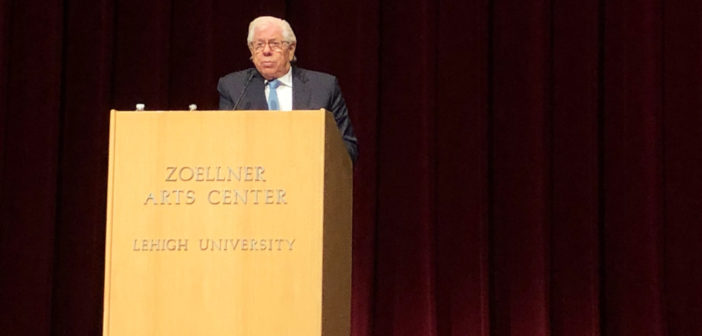Carl Bernstein felt an unfamiliar chill go down his neck as he fed a dime into the coffee vending machine at The Washington Post. He turned to Bob Woodward, who he sat with every morning since they discovered the secret fund that paid for the bugging at Watergate intended to sabotage President Richard Nixon’s political opposition.
Twelve weeks after the break-in, Bernstein and Woodward reported on and exposed the conspiracy.
“This president is going to be impeached,” Bernstein said, knowing the word “impeached” was never used in the newsroom.
“Oh my God, you’re right,” Woodward said.
In light of the recent declaration of impeachment inquiry into current President Donald Trump by House Speaker Nancy Pelosi, Bernstein argued at Lehigh’s 40th Tresolini Lecture on Tuesday that acquiring the “best obtainable version of the truth” and being open-minded are crucial to the future of journalism and democracy.
Bernstein said compared to Nixon, Trump’s response to the free press was “far more insidious” and “far more successful” because he is able to convince Americans that the press is the “enemy of the people,” and he is able to circulate the idea of “fake news.”
The age of social media contributes to the distrust in media and journalists, he said, because people tend to seek out information that only reinforces their views and beliefs.
Journalists have a responsibility to the public to report on facts and provide relevant context for the truth, Bernstein said. However, he said there is a distinction between a responsibility to the press and a responsibility to the legal system.
“Our job is to be judicious, not judicial,” he said.
Bernstein said being a good listener and treating others with respect is integral to the job of a good reporter uncovering injustices. He said most people, regardless of political orientation or organization involvement, want to tell the truth.
Austin Margulies, ‘20, attended the lecture and asked Bernstein how journalism would impact the presidential election based on Michael Smerconish’s conversations on CNN about “forgotten voters.”
“The argument that (Smerconish has) come to is that we need to be paying attention to the people that are not paying attention—the ones who don’t read The Wall Street Journal, The New York Times,” Margulies said.
Bernstein said as one of the oldest democracies, the United States has a systemic problem that inhibits true democracy. Suppression of voting is one issue, he said, and there should be more opportunities for people to vote with less intimidation.
A mistake the country makes, Bernstein said, is believing politics is separate from the larger culture, while it’s actually a reflection of the culture.
With such a widespread selection of news outlets, sources, mediums of communication and information, Bernstein said people—even journalists—struggle to decipher the truth.
Whistleblowers should be protected and encouraged, Bernstein said. The Whistleblower Protection Act was created to hold those in power accountable and reveal incriminating information they try to conceal, which was the case in the recent impeachment inquiry into Trump.
“My conception of American democracy is one in which Donald Trump becomes president,” Sara Boyd, ‘21, said.
Boyd said the upcoming presidential election will be her first time voting in an election.
Bernstein said Trump was successful in gaining control over the public conversation during his campaign and presidency, especially through Tweets.
Many Twitter comments, Bernstein said, reflected anger, ignorance, hatred and close-mindedness of people.
“I think we need to look at the Trump presidency…from a larger perspective and that is that we are in the midst of a cold, civil war,” he said.
During what he referred to as one of the most difficult presidencies to cover, Bernstein said there has been exceptional reporting by new organizations and journalists.
The real enemy of the people, Bernstein said, is the “untruth,” which can be combat if the press works continuously to inform readers of real news and achieve the best obtainable version of the truth.
“It’s a simple concept but very difficult to achieve because of the enormous amount of work, effort, thinking, persistence, pushback, removal of ideological baggage and often luck that is required to get to that objective,” Bernstein said.
Bernstein was only 16 years old when he started working full-time for The Washington Star, where he was mentored and educated by reporters who taught him valuable lessons as a journalist. He later went to college and dropped out.
Despite the difficulties and danger that comes with journalism, Bernstein said Watergate proved the ability and power of the press.
Three months after the break-in, he and Woodward ran the story. Bernstein called The White House for a statement and received “the sources of The Washington Post are a fountain of misinformation,” which Bernstein called a “non-denial denial.”
Bernstein then called former Attorney General John Mitchell—one of the five who controlled the secret fund—and only got through the first few words in the story that disclosed Mitchell’s involvement.
“Jeeesus,” Mitchell said.






Comment policy
Comments posted to The Brown and White website are reviewed by a moderator before being approved. Incendiary speech or harassing language, including comments targeted at individuals, may be deemed unacceptable and not published. Spam and other soliciting will also be declined.
The Brown and White also reserves the right to not publish entirely anonymous comments.